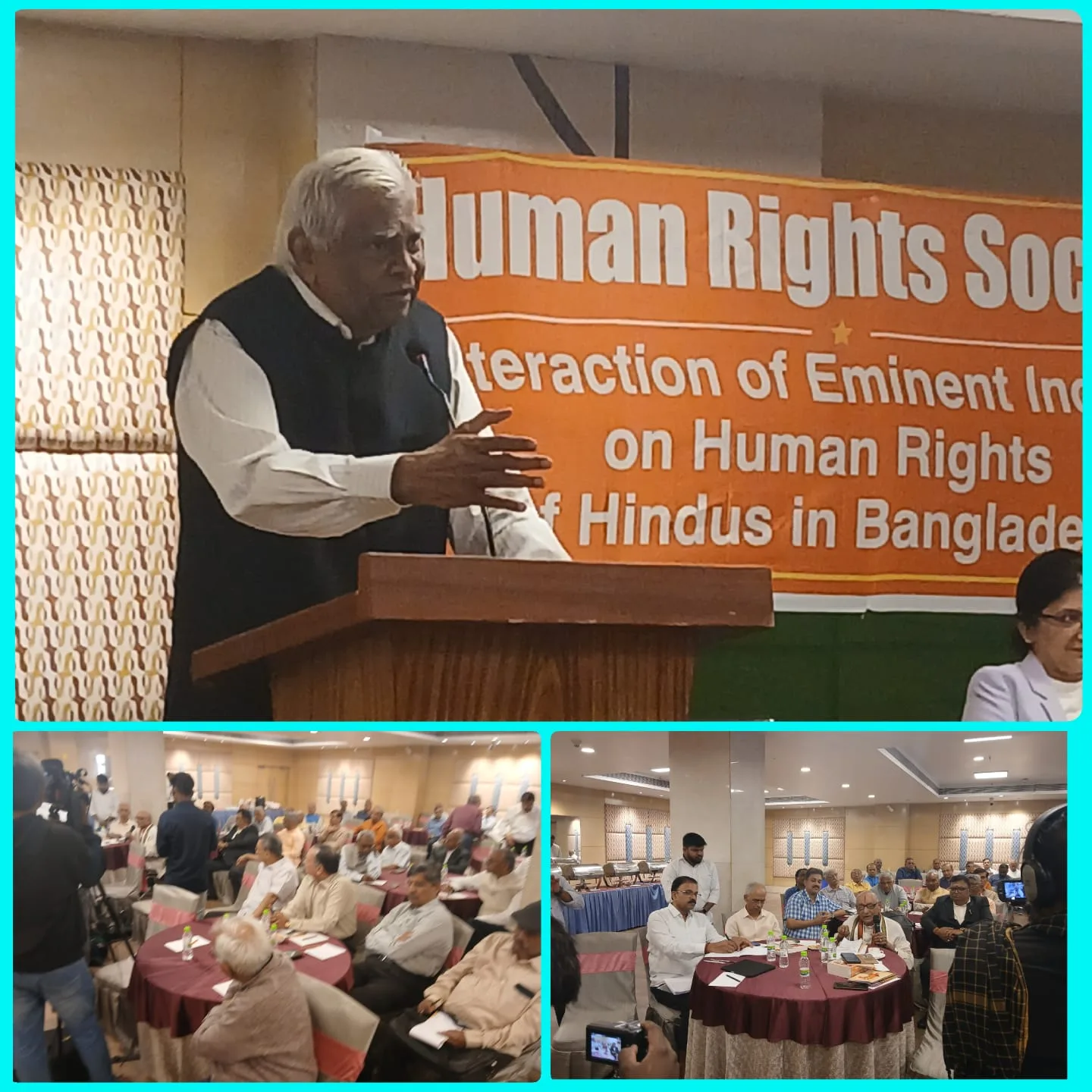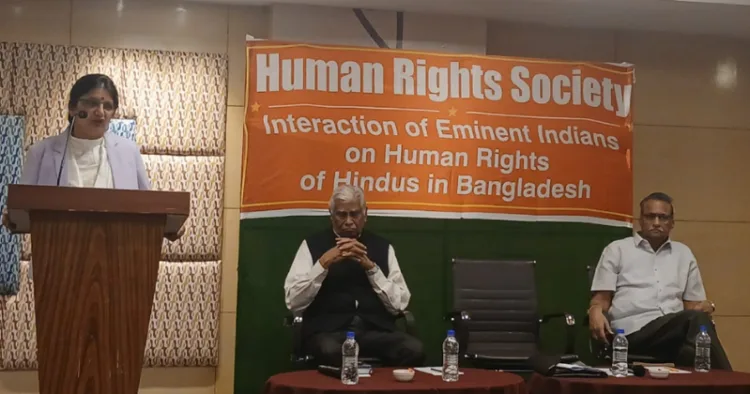The Telangana chapter of the Human Rights Society convened a significant round table meeting in Hyderabad on Tuesday, marking International Human Rights Day. The event focused on the growing violence and systemic human rights violations faced by Hindus in Bangladesh. Attended by prominent journalists, legal experts, and activists, the program shed light on the historical context, current challenges, and actionable measures to address these atrocities.
The keynote speaker, former Home Secretary Padmanabhaiah, emphasized the historical connection between India and its neighboring countries. “Nations like Afghanistan, Pakistan, and Bangladesh were once part of India, sharing a common heritage,” he said. Expressing disappointment on Gujral administration policy of “Neighbourhood First”, linking it to today’s developments. “Despite our efforts to maintain good relations, the plight of Hindus in Bangladesh continues to worsen under a so-called secular constitution.” Calling for urgent action, he stressed, “India must implement a Uniform Civil Code without delay to ensure harmony at home while addressing the rising demographic changes threatening our borders.”

Padmanabhaiah also criticized the hypocrisy of Western nations in addressing global human rights concerns. “The United States and Europe has no moral authority to lecture us on human rights while ignoring the genocide of Hindus in Bangladesh,” he said, demanding a more assertive stance from India on the international stage.
Senior journalist, former editor of Andhra Bhoomi daily, M.V.R. Shastry presented a scathing critique of the leadership in Bangladesh. “Prime Minister Muhammad Yunus must be held directly accountable for the atrocities against Hindus,” he stated. Sastry expressed anger at the silence of international human rights bodies and Indian opposition leaders. “When the United States selectively raises issues but stays silent on Hindu persecution, it exposes a deep bias,” he said. Referring to Indian politics, he added, “Rahul Gandhi’s theatrics in Parliament remind me of a joker, unable to grasp the gravity of such atrocities.”
Highlighting the historical context of persecution, Shastry drew parallels between the 1946 Direct Action Day riots and the current situation in Bangladesh. “It’s the same hatred, the same communal agenda being carried forward,” he said. He also pointed out the atrocities of the 1971 Operation Searchlight under Pakistan’s Yahya Khan, calling it “one of the darkest chapters in South Asian history.”
Social activist and lawyer Monica Arora shared findings from a recent fact-finding mission in Bangladesh. “This is not just about poor Hindus; even affluent and educated Hindus—lawyers, professors, doctors—are being systematically targeted,” she revealed. Arora recounted chilling stories of forced conversions, extortionate jizya taxes, and the looming threat of violence from extremist groups like the Jamaat-e-Islami. “Hindus are being forced to either leave their homeland, convert to Islam, or face brutal violence,” she explained, adding that discriminatory laws have been weaponized to seize properties owned by minorities.
She referred to Taslima Nasrin’s novel Lajja, which vividly described social conditions and created a sensation for its bold narrative. “The attacks on Taslima, including the violent incident in Hyderabad, serve as a grim reminder of the threats faced by those who challenge oppressive norms,” she remarked.
Drawing attention to the recent arrest of ISKCON monk Chinmoy, Monica said, “It is deeply troubling that Chinmoy was detained merely for demanding protection for minorities. His demands were reasonable and just — the establishment of a dedicated ministry for minorities, a tribunal to investigate cases related to them, a conducive environment for Durga Puja, and a dignified life for minorities.”
Monica further elaborated on the case against Chinmoy, stating, “He was accused of sedition during the Chittagong meeting, where he was allegedly arrested for positioning the Bangladesh flag at a lower height. Such actions raise serious concerns about freedom of expression and the weaponisation of laws against those advocating for minority rights.”
Hanuman Chowdary, Chairman of Pragna Bharati, warned of the broader implications of such persecution in Islamic societies. “Non-Muslims in Islamic countries are denied human rights,” he said. He recalled that the Organisation of Islamic Cooperation (OIC), comprising 62 member countries, had openly acknowledged this long ago. Chowdary pointed out that similar conditions existed during the time of Prophet Muhammad in AD 623 and 624, particularly for Jews, and that these conditions later re-emerged in Kashmir and Bengal.
Citing examples from history, he added, “From the massacres of Jews in Prophet Muhammad’s time to the ongoing violence in Kashmir and Bengal, the story remains the same.” Chowdary proposed radical measures, including population transfers, to ensure the safety of Hindus. “India must advocate for justice for Bangladeshi Hindus at the United Nations and international courts,” he urged.
Expressing anguish, Chowdary stated, “The massacres that began in Noakhali in 1946 have continued unabated.” Highlighting the plight of Hindus in Bangladesh, he suggested that a population exchange should be carried out to allow all Hindus from Bangladesh to settle in India. He noted that even Dr. B.R. Ambedkar had raised this issue and cited developments in Bulgaria to emphasise his point.
Chowdary further urged that the massacres in Bangladesh be brought to the attention of the United Nations and the International Court of Justice. Turning his focus to Hyderabad, he criticised the authorities, stating, “While illegal structures are being demolished in the city, the Hyderabadi Muslims’ constructions are not even being looked at.”
Former CBI Joint Director Lakshmi Narayana raised serious concerns about the territorial threats issued by Bangladeshi leaders. “The BNP leaders’ statements about annexing Bengal, Bihar, and Odisha are not just rhetoric. They reveal a dangerous agenda that demands immediate investigation and strong countermeasures from the Indian government,” he said.
Senior journalist Vallishwar demanded urgent global attention to the relentless atrocities against Hindus, calling for bold, immediate action. He stressed the need for a high-level meeting of religious leaders in Delhi and a unified message from all Hindus should be sent to the President of India to convey this, and simultaneous nationwide rallies to expose their suffering. He warned that the youth’s apathy toward this crisis would lead to devastating consequences for their families, urging an uncompromising stand to defend Hindu lives and dignity. He also called for public rallies and declarations by the President of India. “This is not just a regional issue; it is a human rights crisis that needs global intervention,” the participant added.
As part of the round table discussion, several speakers emphasised the need for Hindus to become more vigilant. They referenced the document released by the PFI outlining plans for the Islamisation of Bharat by 2047, the controversial remarks made by AIMIM leader Akbaruddin Owaisi about showing their strength if police stood aside for 15 minutes, and the developments in states like Kashmir, Bengal, Kerala, and Tamil Nadu, urging Hindus to remain alert.
Key Resolutions Proposed following the Round Table Conference:
1. The Indian government must take all necessary steps to end the massacres and human rights violations against Bangladeshi Hindus.
2. Internationalise the issue by raising it at UN Human Rights Commission and other global platforms.
3. Pressure Bangladeshi civil society and government for immediate reforms to protect minorities.
4. Demand the revocation of Muhammad Yunus’s Nobel Prize.
5. Amend the CAA to expedite citizenship for Hindus and implement an Israel-like policy offering citizenship to Hindus globally.
6. Ensure long-term and short-term solutions to prevent future atrocities.
7. Release those arrested in Bangladesh for minority protection activities and guarantee their safety.
8. Focus on sustainable measures to end violence against Hindus worldwide.




















Comments